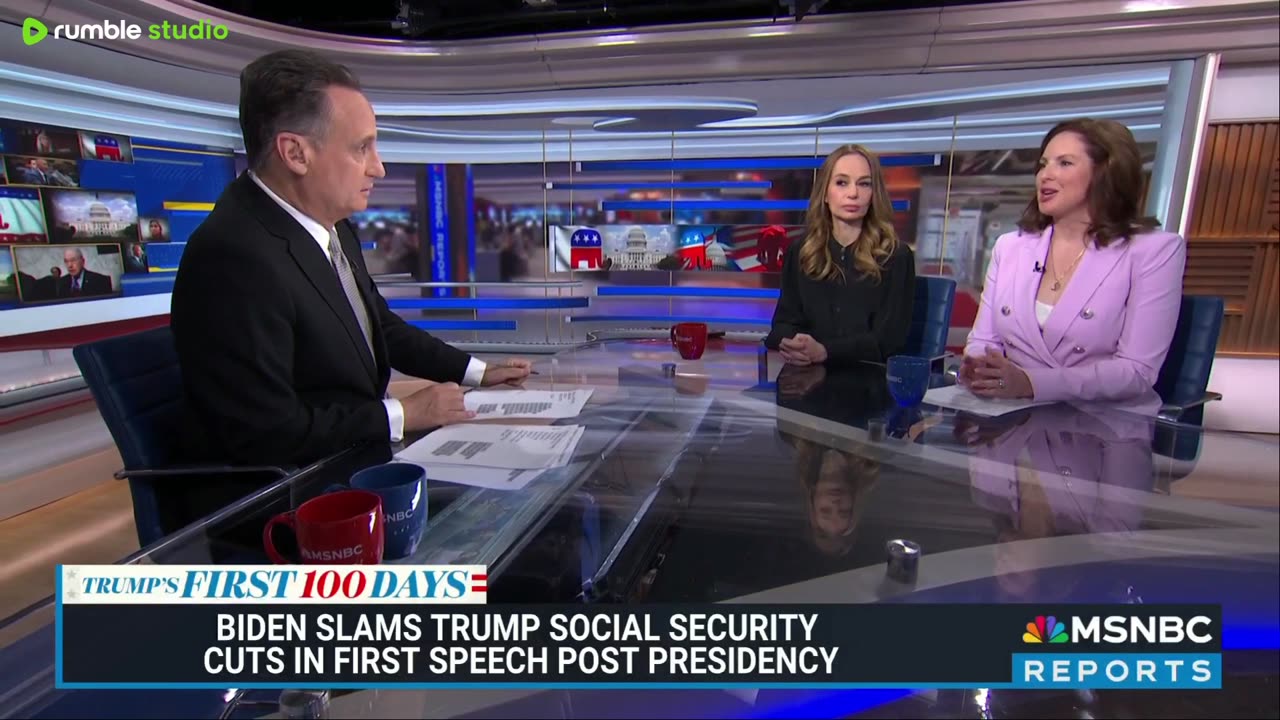Premium Only Content

Expert Commentary on MSNBC’s José Díaz‑Balart Reports
On April 16, on MSNBC’s José Díaz‑Balart Reports, Democratic strategist Julie Roginsky and former Regional Finance Director for the Romney Campaign Lindsey Drath joined host José Díaz‑Balart to react to the wave of town‑hall protests and share their political analysis
José Díaz‑Balart, a Cuban‑American journalist who anchors both José Díaz‑Balart Reports on MSNBC and NBC Nightly News Saturday, guided the discussion, drawing on his decades of moderating high‑stakes political forums. The broadcast reaches over 3 million viewers per episode, underscoring the national attention on these town‑hall clashes
Julie Roginsky, a veteran Democratic strategist and founder of Lift Our Voices—credited with helping pass landmark workplace–harassment reforms—argued that the protesters’ fury goes beyond disagreement on specific spending cuts (such as proposed reductions to Medicaid and Medicare) to a broader backlash against what many see as unchecked executive power under the Trump administration
Lindsey Drath, who served as a Regional Finance Director on Mitt Romney’s 2012 presidential campaign and later led major fundraising initiatives for non‑partisan reform groups, warned that sustained unrest at GOP town halls poses real electoral risks. She noted that angry constituents in swing districts may withhold crucial small‑dollar donations and pressure key fundraisers to demand policy shifts—potentially imperiling vulnerable incumbents in the lead‑up to the 2026 midterms
Their exchange highlighted an urgent need for Republican office‑holders to refine their messaging: recent polling shows growing “Trump‑resistance fatigue” among voters who are torn between principled opposition and weariness of constant confrontation.
At the same time, GOP leaders like House Speaker Mike Johnson have privately urged colleagues to scrap in‑person town halls altogether after a string of testy encounters, underscoring the party’s struggle to balance openness with electoral security
Together, Roginsky and Drath underscored that while policy substance drives much of the anger, the optics of closed‑door events or heavily moderated virtual forums risk feeding a narrative that Republicans are out of touch with their constituents’ everyday concerns—and that without a course correction, the backlash could reverberate through the next election cycle.
-
 1:05:04
1:05:04
Mark Kaye
4 hours ago🔴 Trump Sends Dems Into RAGE Over Flag Burning Executive Order
4.12K8 -
 LIVE
LIVE
Film Threat
18 hours agoVERSUS: AUGUST BOX OFFICE BLOOD BATH! MARVEL IS COOKED! | Film Threat Versus
61 watching -
![[Ep 734] Leftists Support of Black-on-Black Crime | Bolton Raid / Media Hypocrisy](https://1a-1791.com/video/fww1/0e/s8/1/a/F/p/c/aFpcz.0kob-small-Ep-734-Leftists-Support-of-.jpg) LIVE
LIVE
The Nunn Report - w/ Dan Nunn
1 hour ago[Ep 734] Leftists Support of Black-on-Black Crime | Bolton Raid / Media Hypocrisy
180 watching -
 29:39
29:39
Afshin Rattansi's Going Underground
1 day agoEx-Israeli PM Ehud Olmert: INTOLERABLE Amount of Innocent Palestinians Have Been Killed in Gaza
1.73K25 -
 7:49
7:49
Dr. Nick Zyrowski
6 months agoVitamin D is Dangerous? Get The TRUTH!
3.08K11 -
 1:03:48
1:03:48
daniellesmithab
2 hours agoExploring Nuclear Energy in Alberta
7.57K3 -
 LIVE
LIVE
Reidboyy
1 hour ago $0.15 earnedNEW FREE FPS OUT ON CONSOLE NOW! (Delta Force = BF6 with Killstreaks)
39 watching -
 2:30:04
2:30:04
Nerdrotic
5 hours ago $1.67 earnedNerdrotic Nooner 509
18.7K1 -
 1:48:16
1:48:16
Tucker Carlson
3 hours agoCliffe Knechtle Answers Tough Questions About the Bible, Demons, Israel, Judas, Free Will, and Death
64.4K132 -
 LIVE
LIVE
Viss
4 hours ago🔴LIVE - How To Winner Winner Chicken Dinner! - PUBG
143 watching